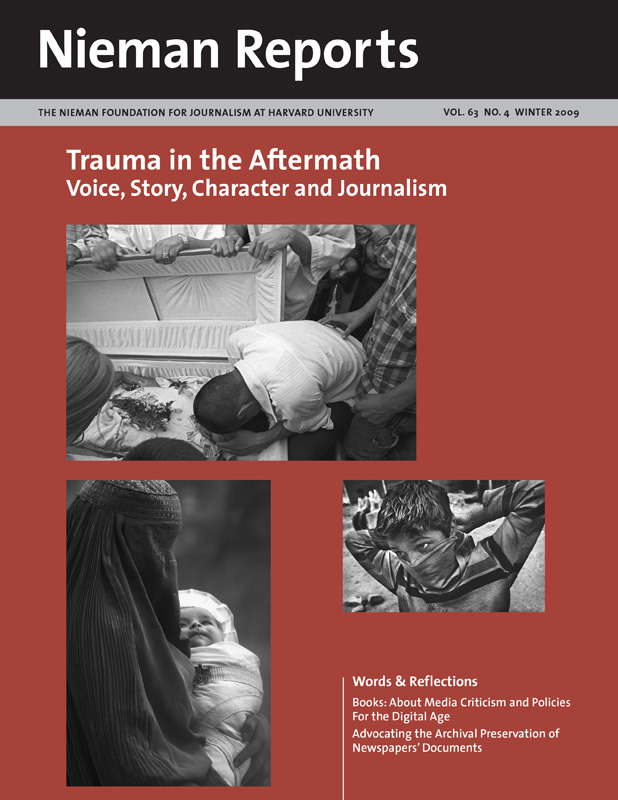The business of journalism is a subject of extensive coverage—explaining the decline in newspaper revenues, the reason newspaper journalists are losing their jobs, stories the public is missing as a result, and the search for new ways of paying for journalism. The journalism of business, on the other hand, is shrinking for the general audience in these lean times. In the midst of a deep, long and global recession, this seems a contradiction, especially since business news reporting has established its place as a respected beat after generations of neglect by mainstream news organizations.
The value of authoritative reporting cannot be underestimated at a time when economic globalization shapes international politics and national interests as much as wars do. And this worldwide financial crisis has a thousand fathers whose deeds deserve public exposure and explanation. Mary L. Schapiro, chairwoman of the Securities and Exchange Commission, has emphasized this point, suggesting, as David Carr of The New York Times put it, that because federal regulators cannot be everywhere at once experienced reporters constitute an added layer of “critical boots on the ground.”
Schapiro’s endorsement of the press as watchdog underscores the value of experienced reporters in holding accountable regulators, government agencies, and the private sector. Here’s the rub. As news staffs get smaller, responsibility for telling such stories increasingly falls to reporters who likely are not prepared to grasp the full complexity of newly created and largely unregulated financial strategies, as happened during this recent crisis. Without having such in-depth understanding, journalists struggle to provide the transparency citizens need to safeguard their interests and the country’s.
The Nieman Foundation is responding to Schapiro’s aspiration for the press through two initiatives designed to educate journalists about business and the economy. Nieman Watchdog has launched a project, “Reporting on the Collapse,” to explain the causes of the economic disaster and the choices facing the country and to point journalists to ideas for stories.
Henry Banta, a lawyer in private practice who has been an adviser to the chairman of the Federal Trade Commission and counsel to the Senate Antitrust and Monopoly Subcommittee, is the lead contributor on this project. “With a few exceptions, the news coverage has never explained how the collapse of the subprime mortgages market could have triggered a massive financial crisis causing hundreds of thousands of people to lose their jobs and their houses,” Banta observed. “[The] shock wave from last year has shaken the foundations of conventional economic thinking. But save for the analysis of a handful of writers, the story has never made it into the news. Yet, without that story, it is impossible to have a rational political debate about what to do to get out of the trouble we are in and prevent it from happening again.”
The Nieman Foundation also will award a fellowship in business journalism, beginning with the class of 2011 under a grant from the Donald W. Reynolds Foundation. The need for this fellowship was captured by Carr in his column: “Journalism is not nuclear physics, does not require a license or special equipment. But I’ve been in business journalism for some years and have constantly bumped hard up against the limits of my land-grant, liberal arts education.”
This Reynolds fellowship is designed to help journalists acquire new levels of knowledge and understanding about business and economic systems, as the beat becomes more challenging. To report with authority on this news, reporters navigate from basic economics to management and investment theories, from personal finance to math and accounting; even law and international politics are interwoven. The range and depth of resources at the Harvard Business School, John F. Kennedy School of Government, and the university’s Department of Economics offer an exceptional environment for the Reynolds Fellow in Business Journalism, who upon returning will be expected to produce stories for visual and print media.
During a year at Harvard, this fellow can make connections with leaders in business, economics and government. This Reynolds fellow also will be included in the foundation’s network of business journalists at the National Center for Business Journalism at Arizona State University as well as business journalism programs at the University of Missouri School of Journalism, Washington and Lee University, and the University of Nevada, Reno.
A decline in daily newspaper business coverage may be inevitable, and these initiatives by the Nieman Foundation surely will not reverse this trend. But they will contribute to the education of journalists who, in turn, will better inform the public about things they don’t know but should.


